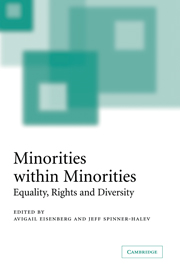Book contents
15 - Associative democracy and minorities within minorities
Published online by Cambridge University Press: 22 September 2009
Summary
That policies of multiculturalism are confronted with a serious dilemma is not really contested. Structural and cultural inequalities between majorities and minorities may require a fair amount of autonomy for minorities. However, structural and cultural inequalities within minorities require the protection of individuals and vulnerable minorities (women, minors, homosexuals, dissidents) against their organizations and leaders. These inequalities may be strengthened by multicultural policies. Roughly, one can distinguish between three different approaches: (i) a radical “absolutist free exercise,” “deference” or “unavoidable costs” approach; (ii) a radically secularist and individualist “re-universalizing citizenship” approach; and (iii) a “liberal democratic accommodationist” approach.
(i) Complete deference to the nomos (customs, ecclesiastical law), decision-making and authority of ethno-religious groups is defended by two radically different, theoretical and political positions. Radical libertarians like Kukathas (1998) defend complete deference to the nomos of religious groups, far-reaching autonomy and absence of any state intervention or scrutiny. These radical libertarians assume free, informed consent by adults and that entry into groups, associations and organizations should be as free as exit.
Traditionalist or conservative communitarians (as well as conservative religious leaders and fundamentalist religious politicians) defend absolutist deference and autonomy in a completely opposite way. “Our” illiberal and anti-democratic religion does not value “individual autonomy” and “free choice” at all, or not in the same way as radically individualist, modern liberals do.
Information
- Type
- Chapter
- Information
- Minorities within MinoritiesEquality, Rights and Diversity, pp. 319 - 339Publisher: Cambridge University PressPrint publication year: 2005
Accessibility standard: Unknown
Why this information is here
This section outlines the accessibility features of this content - including support for screen readers, full keyboard navigation and high-contrast display options. This may not be relevant for you.Accessibility Information
- 7
- Cited by
